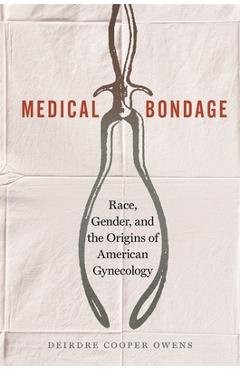Medical Bondage: Race, Gender, and the Origins of American Gynecology - Deirdre Cooper Owens

Detalii Medical Bondage: Race, Gender, and
libris.ro
242.32 Lei
269.24 Lei
Medical
Deirdre Cooper Owens
Medical Bondage: Race, Gender, and - Disponibil la libris.ro
Pe YEO găsești Medical Bondage: Race, Gender, and de la Deirdre Cooper Owens, în categoria Medical.
Indiferent de nevoile tale, Medical Bondage: Race, Gender, and the Origins of American Gynecology - Deirdre Cooper Owens din categoria Medical îți poate aduce un echilibru perfect între calitate și preț, cu avantaje practice și moderne.
Preț: 242.32 Lei
Caracteristicile produsului Medical Bondage: Race, Gender, and
- Brand: Deirdre Cooper Owens
- Categoria: Medical
- Magazin: libris.ro
- Ultima actualizare: 28-10-2025 01:22:05
Comandă Medical Bondage: Race, Gender, and Online, Simplu și Rapid
Prin intermediul platformei YEO, poți comanda Medical Bondage: Race, Gender, and de la libris.ro rapid și în siguranță. Bucură-te de o experiență de cumpărături online optimizată și descoperă cele mai bune oferte actualizate constant.
Descriere magazin:
The accomplishments of pioneering doctors such as John Peter Mettauer, James Marion Sims, and Nathan Bozeman are well documented. It is also no secret that these nineteenth-century gynecologists performed experimental caesarean sections, ovariotomies, and obstetric fistula repairs primarily on poor and powerless women. Medical Bondage breaks new ground by exploring how and why physicians denied these women their full humanity yet valued them as medical superbodies highly suited for medical experimentation. In Medical Bondage , Cooper Owens examines a wide range of scientific literature and less formal communications in which gynecologists created and disseminated medical fictions about their patients, such as their belief that black enslaved women could withstand pain better than white ladies. Even as they were advancing medicine, these doctors were legitimizing, for decades to come, groundless theories related to whiteness and blackness, men and women, and the inferiority of other races or nationalities. Medical Bondage moves between southern plantations and northern urban centers to reveal how nineteenth-century American ideas about race, health, and status influenced doctor-patient relationships in sites of healing like slave cabins, medical colleges, and hospitals. It also retells the story of black enslaved women and of Irish immigrant women from the perspective of these exploited groups and thus restores for us a picture of their lives.

Produse asemănătoare

Medical Bondage: Race, Gender, and the Origins of American Gynecology - Deirdre Cooper Owens
![]() libris.ro
libris.ro
Actualizat in 28/10/2025
242.32 Lei
Produse marca Deirdre Cooper Owens

Medical Bondage: Race, Gender, and the Origins of American Gynecology - Deirdre Cooper Owens
![]() libris.ro
libris.ro
Actualizat in 28/10/2025
242.32 Lei